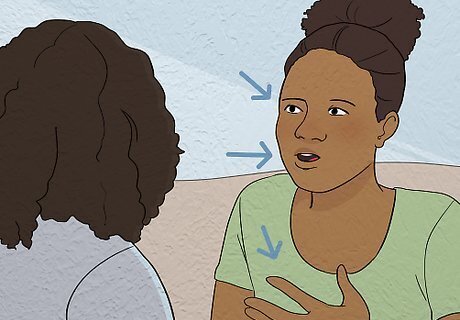
views
Apologizing to Your Sibling

Find a quiet, private place to talk. You should start by apologizing to your sibling in a sincere, genuine way. Find a place that is quiet and private to make the apology and do it in person. Apologizing in person will show your sibling that you want to speak to them face to face and have a real discussion about what went wrong. You may choose to apologize in your sibling’s room or you may apologize in a common area in your home, such as the living room or the kitchen. Ask your sibling, "Can we talk in private for a second?", or, "I'd like to chat with you in here." If you and your sibling do not live together, you should choose a neutral place to apologize, such as a nearby coffee shop or a park bench. Try to find somewhere that is private enough for a conversation. If you find talking to your sibling in person too difficult initially, try writing them a letter to open up communication between the two of you.

Maintain open body language. You should set the tone for the apology by displaying open body language, which will make the conversation feel less threatening and stressful for your sibling. You should maintain eye contact when you talk to your sibling and keep your voice even and calm. Avoid raising your voice, shouting, waving your arms, or making quick gestures. You want to stay calm and collected during the apology. You should also position your body so it faces your sibling, and lean towards them. This will show your sibling that you are engaged in the conversation. Reader Poll: We asked 174 wikiHow readers about the best way to deal with anger, and only 9% of them said visualizing a happy place. [Take Poll] If you start to feel angry, try doing deep breathing exercises to calm yourself, instead.

Apologize using “I" statements. When you do apologize, you should always use “I” statements. This will show your sibling that you are able to stand by your statements and take accountability for your actions. Do not use “you,” as this shows you are making assumptions about your sibling’s behavior. Instead, try to speak only for yourself using “I.” You may start your apology by identifying what you think the conflict was about and admitting you made a mistake. You may say, “I was wrong to say mean things about you to your friends. I realize now it was unkind of me. I’m sorry for what I did.” Sometimes conflict arises and there's no clear fault, such when you disagree on a topic. In this case you can say something like, "I know we still don't see eye-to-eye about this, but I'm sorry that I became defensive over it, and I'm sorry we fought about it."

Empathize with their feelings. You should also show empathy towards your sibling and let them know that you can understand why they may be upset. Acknowledging their feelings will show your sibling that you care about how they feel and do not want to hurt their feelings again. For example, you may say, “I understand why you are mad at me for what I did. I know now what I did was not very nice. I’m sorry and I hope you accept my apology.”
Making Amends

Ask what you can do to make things right. Once you have apologized to your sibling, you should offer to make amends. Do this by asking your sibling, “What can I do to make it up to you?” You may also come up with your own way of making amends for what you did and present possible solutions or options to your sibling. Offering to make amends will show your sibling that you care about making them feel better and resolving the conflict. For example, if you spoke badly about your sibling to their friends, you may offer to go speak to their friends and set the record straight. You may say, “Would you like me to go talk to your friends and let them know what I said about you wasn't true?”

Talk about how you'll behave in the future. Part of your apology might be talking to your sibling about how you will handle similar situations should they arise in the future. You can also ask your sibling how he would like you to act. You could say something like, "Next time I hear important news about grandpa's health, I will make sure I call you right away, even if I think the news will upset you." Or, "What would you like me to do next time instead?"

Give your sibling space. You should also take a step back and give your sibling some space to process your apology. Allow your sibling some time to accept your apology on their own and get over the conflict. You may tell them, “I’m going to give you some space to think about my apology. Let me know if you’d like to talk more about this later.” Avoid putting pressure on your sibling to accept your apology right away. Doing this may lead to another conflict or further issues between you. Instead, take a step back and give them the space they need.

Make a kind gesture toward your sibling. You can also make amends by putting your feelings into action and doing something nice for your sibling. This could be a small, kind gesture or a grand gesture. Doing something nice for your sibling can show them you feel bad about what you did and want to make it up to them. You may do something kind and small for your sibling, such as picking up their favorite drink for them or preparing their favorite food. Or you may take them out for dinner or for a drink on you to show them you feel bad for what you did or that there's no hard feelings.
Avoiding Conflicts in the Future

Be an active listener. You can avoid conflicts in the future with your sibling by focusing on being a good, active listener. This means listening to what your sibling is saying without judgement or thinking about your response or rebuttal — truly listen to and absorb what they are saying. Then try affirming you have understood what they have said. You may say, “What I am hearing you say is… Is that right?” Once they have confirmed you heard them correctly, you can respond and share your thoughts. Avoid interrupting your sibling when they are speaking and focus on listening closely to what they have to say, even if you do not necessarily agree with them.

Talk out any issues before they become conflicts. Honest and open communication is important in maintaining a healthy relationship with your sibling. You should also pay attention to subjects or topics that tend to lead to a fight with your sibling and talk them out in a healthy way. Recognize that you might have a pattern of conflict with your sibling and work to talk through any topics that may be sensitive. This way, you can prevent a conflict before it starts and have a healthier relationship with each other. For example, maybe you and your sibling tend to argue about who gets to use the family car. You may address this pattern of conflict by suggesting work together to create a schedule in which you switch on and off with using the car. This way, you are both less likely to fight out this issue. Sometimes you may need to simply avoid the topic. If you know you and your sibling get very heated when you discuss politics, you can agree to disagree and decide that you will not discuss them.

Do kind things for each other. You should make an effort to show your sibling that you care about them and love them, even in small ways. Doing kind things for them will help to reduce any tension or stress between you and infuse your relationship with empathy and compassion. You should try to do one kind thing for each other a week or make a point of doing something kind of your sibling every time you see them. For example, you may bring a nice bottle of wine with you to dinner when you go over to your sibling’s house to show them you are considerate and did not want to arrive empty-handed. Or you may offer to buy your sibling’s coffee when you are out together as a kind gesture. You can also do kind things for your sibling around the house, such as offering to help them weed their garden or put together a new bureau for their bedroom.



















Comments
0 comment